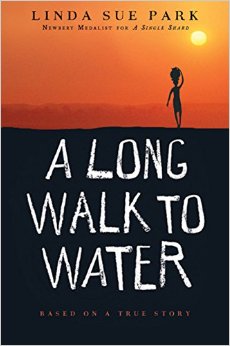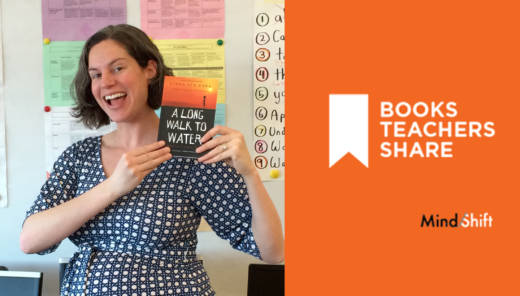Boston middle school English teacher Lillie Marshall loves to travel. On top of teaching English to 140 seventh graders of diverse backgrounds each day, Marshall finds time to run two travel blogs, Around the World L, a log of her own travels, and Teaching Traveling, which profiles teacher travelers like her on their own journey for self-discovery and understanding. A book that has significantly impacted her teaching is the young adult novel A Long Walk to Water by Linda Sue Park, based on a true story of the one of the Lost Boys of Sudan. The book intertwines two narratives, one of 11-year-old Salva as he escapes the ‘80s violence in Sudan and is adopted by an American family, and that of Nya, a young girl growing up in modern-day Sudan and her daily life, which revolves around the ordeal of getting water.
Marshall talked to MindShift about why A Long Walk to Water has had such a big impact both on herself and her students, especially since Marshall spent more than a year living and volunteering in West Africa, and she now teaches the book to her seventh graders. The conversation has been edited for clarity and length.
 A Long Walk to Water came out fairly recently, in 2010, and it’s a slim book. People discount it as sort of childish, but I feel that this book is so important, and relevant and deep for all ages. It’s based on the true story of one of the Lost Boys of Sudan in the 1980s, a boy named Salva who had to flee his village because of the violence and ended up walking, basically, across East Africa. He ended up in two refugee camps, and then was adopted by a foster family in Rochester, New York. The story is interwoven with the story of a girl named Nya in Sudan in the 2000s, just going through how her day focuses on fetching water every day. Their stories end up converging when Salva finds a solution to Nya’s water problems.
A Long Walk to Water came out fairly recently, in 2010, and it’s a slim book. People discount it as sort of childish, but I feel that this book is so important, and relevant and deep for all ages. It’s based on the true story of one of the Lost Boys of Sudan in the 1980s, a boy named Salva who had to flee his village because of the violence and ended up walking, basically, across East Africa. He ended up in two refugee camps, and then was adopted by a foster family in Rochester, New York. The story is interwoven with the story of a girl named Nya in Sudan in the 2000s, just going through how her day focuses on fetching water every day. Their stories end up converging when Salva finds a solution to Nya’s water problems.
In Chimamanda Ngozi Adichie’s TED talk, “The Danger of a Single Story,” she talks about how people have this sort of stereotype about Africa -- that’s it’s poor, it’s helpless, there’s nothing of worth there, it’s dirty. It’s such a disempowering and untrue story that ignores the powerful, smart and ingenious people within Africa. And what I love about this book is the boy, Salva, by the end of the book is incredibly empowered and important, educated and helpful to his community. He’s not just waiting around for people from the outside to help, he’s someone from within the community who has gone through great hardships and come back to help his community.
As a teacher, it made me realize how important it is to provide opportunities for young people, especially when often you don’t know the background that they come from. Often we do have students who have traumatic backgrounds like this, maybe in a different context. In that way, it really motivates me to do an awesome job as a teacher and to provide a great service to the students that I teach.



